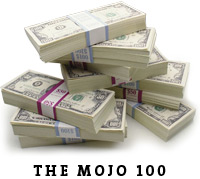
Photo: Getty Images
MoJo 100 | Hard Money 100 | Soft Money 100
527 Groups These nonprofits are set up exclusively to influence the political process and are required to disclose their donations to the Internal Revenue Service. Reformers and Republican Party lawyers have asked the Federal Election Commission to severely restrict the ability of these groups to influence federal elections. A ruling is expected as early as May.
501(c)4 Groups These nonprofits are deemed ideological lobbying organizations under the IRS code. Like 527’s, they can spend a significant portion of their funds on political communications though there may be stricter tax penalties. 501(c )4’s that do not receive contributions from unions or corporations can claim a special status—often called the MCFL exemption— that allows the group to run issue advertising in the weeks immediately before an election, a tactic now banned for many groups under the new law. These groups file annual tax returns that must be made public, but are not required to disclose their donors.
501(c)3 Groups These nonprofits are generally founded for religious, educational or charitable purposes. They are not supposed to directly engage in any political activities, though some semi-political functions, including voter registration activities, are allowed. These groups make their tax return public, but are not required to disclose their donors.
Unions and Trade Organizations Organized under sections 501(c)5 and 501(c)6 of the law, these groups can spend a portion of their funds on direct political action, including issue advertising and voter registration. They are not required to disclose their donors.
Political Action Committees These are committees, often set up by unions and corporations, that can pool smaller, regulated donations from individual members or employees. They are often tied to the types of non-profits listed above, providing the organizations outside vehicles to directly contribute to a candidate or party. All contributions to PACs must be publicly reported to the Federal Election Commission.
Candidates and Parties Political parties and individual candidates can directly receive money from PACs and individuals, money which must be reported to the FEC. Campaign finance reform raised the limits on these donations for any single individual. Every American can now give $2,000 to each candidate for each election (including primaries) and up to $95,000 to candidates and political parties in any two-year election cycle.















